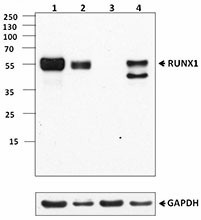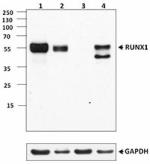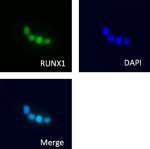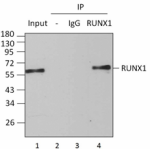- Clone
- 1C5B16 (See other available formats)
- Regulatory Status
- RUO
- Other Names
- Runt-related transcription factor 1, Acute myeloid leukemia 1 protein (AML-1), Polyomavirus enhancer-binding protein 2 alpha B subunit (PEBP2-alpha B), SL3/AKV core-binding factor alpha B subunit
- Isotype
- Mouse IgG2a, κ
- Ave. Rating
- Submit a Review
- Product Citations
- publications

-

Western blot analysis of Jurkat (lane 1), THP-1 (lane 2), Hela (lane 3) and Raw264.7 (lane 4) cells using anti-RUNX1 antibody (1C5B16). GAPDH antibody (poly6314) was used as loading control. -

Jurkat cells were stained with purified anti-RUNX1(clone 1C5B16) antibody, followed by staining with DyLight™ 488 conjugated goat anti-mouse IgG (green) antibody. Nuclei were stained with DAPI (blue). -

Immunoprecipitation of RUNX1 from Jurkat cell extracts. Lane 1 is 5% input. Immunoprecipitation was performed using protein G resins only (lane 2), mouse IgG isotype control (lane 3), and anti-RUNX1 antibody (clone 1C5B16, lane 4). Western blot was performed using anti-RUNX1 antibody (clone 1C5B16).
| Cat # | Size | Price | Quantity Check Availability | Save | ||
|---|---|---|---|---|---|---|
| 659302 | 100 µg | $265 | ||||
RUNX1 belongs to the runt domain family of transcription factors and regulates target gene expression through forming a heterodimeric DNA-binding complex with CBFB. RUNX1 was first identified as a RUNX1-ETO fusion protein in acute myeloid leukaemia (AML) and is frequently mutated in AML and myelodysplastic syndrome due to chromosomal translocation. RUNX1-deficient mice fail to generate hematopoietic stem cells. RUNX1 regulates CD4 gene transcription during multiple stages of T cell development and represses the CD4 gene in CD4-CD8- (double negative) T cells. RUNX1 is also required for the differentiation of CD8+, Th17, and regulatory T cells. Impaired differentiation of megakaryocytes and decreased circulating platelet count was observed in the absence of RUNX1. These findings revealed that RUNX1 acts as a tumor suppressor for myeloid leukemia and is crucial for the development and terminal differentiation of several blood cell lineages.
Product DetailsProduct Details
- Verified Reactivity
- Human
- Reported Reactivity
- Mouse
- Antibody Type
- Monoclonal
- Host Species
- Mouse
- Immunogen
- Partial human RUNX1 recombinant protein (191-350 aa) expressed in E. coli.
- Formulation
- Phosphate-buffered solution, pH 7.2, containing 0.09% sodium azide.
- Preparation
- The antibody was purified by affinity chromatography.
- Concentration
- 0.5 mg/mL
- Storage & Handling
- The antibody solution should be stored undiluted between 2°C and 8°C.
- Application
-
WB - Quality tested
ICC, IP - Verified - Recommended Usage
-
Each lot of this antibody is quality control tested by Western blotting. For Western blotting, the suggested use of this reagent is 0.25 - 1.0 µg per mL. For immunoprecipitation, the suggested use of this reagent is 10 - 30 μg per mL. It is recommended that the reagent be titrated for optimal performance for each application.
- Application Notes
-
This clone is not recommended for ChIP (Chromatin Immunoprecipitation) assays (as determined by in-house testing).
This product weakly reacts with Mouse. - Product Citations
-
- RRID
-
AB_2563194 (BioLegend Cat. No. 659302)
Antigen Details
- Structure
- 453 amino acids encode a protein with a predicted MW of 48.7 kD. Contains a Runt domain responsible for DNA binding.
- Distribution
-
Nucleus.
- Function
- RUNX1 is a transcription factor that plays crucial roles in hematopoiesis, hair follicle development, neurogenesis, chondrogenesis, and leukemogenesis.
- Interaction
- Interacts with TLE1, ELF1, ELF2, ELF4, SPI1, KAT6A, KAT6B, YAP1, and CDK6. Forms a heterodimer with CBFB.
- Cross
- Human, Cross-Reactivity: Mouse (weak)
- Cell Type
- B cells, Neural Stem Cells, Neutrophils
- Biology Area
- Apoptosis/Tumor Suppressors/Cell Death, Cell Biology, Immunology, Neuroscience, Neuroscience Cell Markers, Stem Cells, Transcription Factors
- Antigen References
-
1. Goyama S, et al. 2013. J. Clin. Invest. 123:3876.
2. Wang J, et al. 2013. PLoS One. 18:e74255.
3. Taniuchi I, et al. 2012. EMBO J. 31:4098.
4. Neel BG, et al. 2012. Genes Dev. 26:1520.
5. Della Gatta G, et al. 2012. Nat. Med. 18:436.
6. Hoi CS, et al. 2010. Mol. Cell Biol. 30:2518. - Gene ID
- 861 View all products for this Gene ID
- UniProt
- View information about RUNX1 on UniProt.org
Related Pages & Pathways
Pages
Related FAQs
Other Formats
View All RUNX1 Reagents Request Custom Conjugation| Description | Clone | Applications |
|---|---|---|
| Purified anti-RUNX1 | 1C5B16 | WB,ICC,IP |
Customers Also Purchased
Compare Data Across All Formats
This data display is provided for general comparisons between formats.
Your actual data may vary due to variations in samples, target cells, instruments and their settings, staining conditions, and other factors.
If you need assistance with selecting the best format contact our expert technical support team.

 Login/Register
Login/Register 














Follow Us